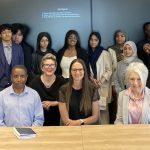London 2012 – How the Olympics inspired the youth
Written by Rosa High, Project Manager, Education Works and Maria Tonchievici, Team Leader – Mentoring Works ELBA and Project Manager – Mentoring Works BIG Alliance
This year marks 10 years since the 2012 London Olympics. As an education team, we wanted to take the opportunity to reflect on the effects that the Olympics had on our students, their education and skills development through volunteering.
With the Olympics being held in London, the aims were clear; drive social change, encourage social regeneration and to bring communities together. But how did these aims relate to our students? How many young people were inspired to volunteer at the Olympics? Has that experience had a positive impact?
With the motto “Inspire a Generation”, the Olympic Games London 2012 was the third hosted by Great Britain. From the outset, it strived to foster long-term benefits for London’s East End, the UK’s wider population and economy, and even people overseas. The main aims of London 2012 were: increasing public participation across multiple sports, the urban transformation of east London and boosting both sustainability and economic opportunities in the city and beyond.
Education and young people
Get Set, the Organising Committee’s education programme, was set up to spread the Olympic spirit in schools and educate children on the Olympic values of friendship, excellence and respect. 85% of all UK schools participated in Get Set, with 92% of teachers reporting that their pupils were inspired by the Games. By 2018, the initiative had reached more than half of all 3-19-year-olds across the UK.
With nearly two-thirds of the local population being under 34, there was a huge opportunity to harness the talents of young people by creating connections with people and organisations that would otherwise not be available to them. Nearly 400 young people benefited from being directly involved in the Legacy Youth Voice, a leadership and development programme designed to engage young people in shaping and developing the new places around Queen Elizabeth Olympic Park.
Overseas, the Inspire a Generation vision stimulated the International Inspiration programme, which was established to create a positive legacy for youth in developing nations. By 2016, the programme had reached more than 25 million people in 20 countries.
London 2012 and young volunteers
A quarter of a million people applied to be a Games Maker and 70,000 were successful in making London 2012 happen and carried out a total of 8,000,000 volunteer hours. This was the biggest volunteer campaign since World War Two which inspired a full cross-section of the population to volunteer. Demographic data for the Games Maker programme showed a broad range of people (in terms of age, ethnicity and place of residence) were recruited to take part, although the programme was most popular with younger and older age groups (23% were aged 16-24 while 27% were 55 and over) – consistent with the pattern of volunteering in the general population and reflecting the increased leisure time generally available to students and retired people. Four per cent of the volunteer workforce were disabled people.
Volunteers across all programmes reported a high level of satisfaction with the experience and there were also opportunities to develop a variety of skills. In a survey of Games Makers, 31% highlighted gaining customer service skills, 29% teamwork skills and 27% communication skills. There was also recognition that they would be able to apply these skills in other volunteering, as well as paid employment. The role played by volunteers at the Games attracted high levels of media coverage and interest from the public. This positive response has helped to raise the profile of volunteering and increase recognition of the contribution volunteers make. The Games inspired many people to volunteer for the first time or to increase the amount they volunteer. A survey of Games Makers found that 20% of respondents had not volunteered before, with the chance to be part of the once in a lifetime opportunity afforded by the Games the primary motivating factor for people to get involved.
It is clear that the Games have created an increased interest in and awareness of opportunities for volunteering and community involvement. “It really made me appreciate the value of volunteer work, how it is often undervalued, and want to carry on doing more after the Olympics,” said a young volunteer who provided technical support to synchronised swimming judges in the Olympics Aquatics Centre.
To stay up to date with the latest news, opportunities and success stories, please sign up to receive our monthly newsletter, here.



